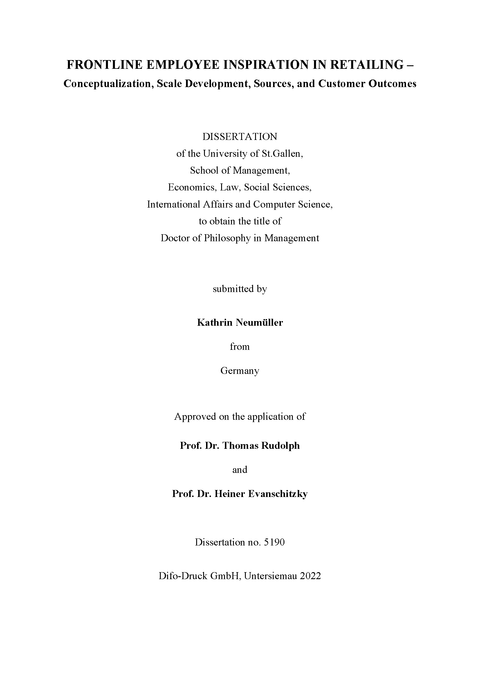
Frontline Employee Inspiration in Retailing
Author: Kathrin Neumüller
Language: English (nur als PDF-Datei erhältlich)
Brick-and-mortar retailers face an increasingly competitive market environment. Against this background, frontline employee (FLE) inspiration is a promising strategy to motivate frontline employees (i.e., employees with regular customer contact, FLEs) to go beyond role requirements and drive them to provide superior service quality. While a few retailers (e.g., IKEA, Nespresso, Apple) have recently come to harness the power of inspiration to drive FLE performance, most other companies have yet to recognize this approach. Despite its potential to leverage FLE performance, FLE inspiration has not yet been empirically examined. Service research lacks a clear conceptualization of FLE inspiration, a reliable and valid scale to measure it, the knowledge of its relationship with established FLE constructs, the sources that evoke it, and its effects on customer outcomes. Addressing these gaps in the service research, I conceptualize FLE inspiration as a temporary, intrinsic motivational state during which FLEs gain epistemic insights from within or outside the workplace and feel compelled to actualize, transmit, or express these epistemic insights at work (Study 1). To measure FLE inspiration, I develop and validate a 6-item scale with excellent psychometric properties (Studies 2 to 5) and show that FLE inspiration is embedded in a meaningful network of related antecedents (e.g., work-related curiosity) and outcomes (e.g., FLE proactivity) (Study 5). Various sources in the FLEs work-related environment (e.g., coworkers, customers, corporate values) and private environment (e.g., family, personal values) (Studies 6 and 7) may evoke FLE inspiration. Finally, I provide evidence for the employeecustomer inspiration linkage, showing that inspired FLEs, more so than satisfied FLEs, may inspire customers and enhance various customer outcomes (e.g., loyalty, purchase intentions) (Study 8). This dissertation extends the study of inspiration to the FLE context, addressing the call for further research on the understudied topic of FLEs and the psychological mechanisms that drive their behaviors and attitudes. My investigation of the employeecustomer inspiration linkage contributes to a better understanding of the psychological mechanisms that govern interactions between customers and employees, particularly during face-to-face encounters. From practitioners perspective, FLE inspiration constitutes a new, important metric to enhance FLEs level of intrinsic motivation, proactivity, satisfaction, and creativity and influence customer responses during service interactions. I provide a step-by-step guide to make the empirical insights actionable.
